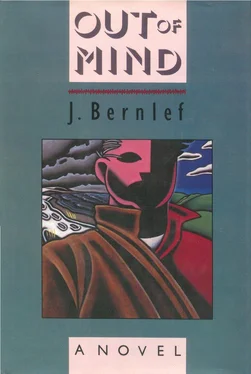Vera puts her forefinger on male and female figures and mentions names. Kitty, Janet, John, Fred. Three years ago, in Rockport.
I remain silent.
'You should concentrate more,' she says. 'You know it all, but you must try harder.' She taps briefly with a gleamingly lacquered nail against my forehead.
I pull the album towards me and turn the pages back. Then it is as if a mist clears.
'Look,' I say. 'This was the boat elevator at the Postjesweg. Other people called it a ferry, but it wasn't, it was an elevator. The market gardeners from the Sloterpolder used to assemble here with their punts and flat-bottoms to go to the market. One by one the boats entered a kind of steel trough. Then the big cog-wheels overhead began to turn and each boat was lifted by thick cables into the Kostverlorenkade, swaying and trembling. Sometimes as many as forty boats were waiting, beside and behind one another, laden with vegetables and fruit in those flat crates they used to have.'
'And this was taken from the window at home. Where you see all those green-houses and wooden shacks another world began, a water world full of punts, flat-bottoms, rafts and white foot bridges across the ditches. In the winter you could skate there endlessly. Frisian runners. Can you feel them still, pinching your feet, with those tight, brightly coloured straps and those stiff leather heels?'
I look at Vera. She nods. 'I remember it all,' she says. 'I went there with you often enough.' I am so happy to hear her say this that I want to go on talking, without the photographs.
'At the beginning of the war you could still sometimes get stuff from the market gardeners in the polder, but in the last two years they had become price conscious. The heirlooms some people took there, in return for a head of lettuce or a few bunches of carrots!'
'You were lucky to have that job,' she says.
That is true. People working in the municipal buying department were closer to the fire. You knew when something or other arrived by barge. Then it was sometimes possible to fix things before distribution began. Of course it wasn't right, but everyone did it. In a way we were all of us petty crooks in those days, and the crazy thing was that it suited everybody perfectly. It brought a lot of suspense and excitement into people's lives.
'Do you ever think of those days now?' I ask.
'Rarely,' she says.
'It's things from the war I remember best,' I say. 'They're sharp, as if everything was standing still then, as if nothing moved.'
'Yes,' she says. 'That's how I feel too. Days that never came to an end. Maybe it was partly because of the hunger. Hunger and cold.'
'Pea soup!' We both say it at the same time, that utterly Dutch concept. Pea soup. And it makes us laugh.
'Those bay windows were no good,' I say. 'After the war practically all of them had to be replaced. They jutted out too far, they caught too much wind, certainly in that storm we had that time.'
'I had no idea it was so dangerous.'
'Peas,' I say, 'I'd managed to get hold of half a pillowcase full.'
'We were as happy as kings. I was so nervous, as if I was cooking dinner for the first time, I was so scared I might spoil something.'
'Fred had crawled under the table, the wind was making such a din. It roared in all the chinks and cracks.'
'It was lucky he'd crawled out of harm's way when it happened.'
'I can see you now,' I say. 'Your hair flying in all directions because of the wind suddenly crashing in, and that plate of soup in front of you, suddenly full of splinters.' 'A miracle we weren't hurt ourselves,' she says.
'I was furious. Especially because I couldn't blame it on the Huns.'
'We put the soup through the sieve, but we daren't take the risk.'
'You were about to,' I say, 'you were standing in the kitchen straining the soup. You slowly and carefully poured it into a funnel over a sieve you had put on top of the saucepan. You cried when I said you had to throw the soup away.'
'Such things you never forget.'
'No,' I say, 'such things stay with you forever.'
She turns a few more pages. 'Here,' she says, 'in the tea garden, do you remember? The camera moved because I was scared Fred would fall from that branch.'
I nod. I see myself, about thirty-five years old. I am wearing a sweater with a dark horizontal stripe, and shapeless grey pants. With a half-blurred face I look up at a child that sits astride a stripped branch. I nod again. I would love to know.
'Usually you took the photos,' she says. 'That's why there are so few of you.'
'I wasn't much of a photographer, though. And I often forgot to take the film out and take it to the store.'
'Do you remember that time we were given the wrong ones? Quite by chance I knew those people. I saw the woman occasionally at the grocery store, at De Gruyter's, that clean, tiled store where it always smelled so deliciously of roasted coffee which they ground for you in a big round grinder with a silver funnel on top.'
'I know,' I say, 'but I can't remember what was in those photos.'
'Neither can I, except that they weren't our holiday snapshots. We'd been to the Veluwe. Kitty wasn't born yet.'
'And ours? Did we ever get those back?'
'No. I gave the others to that woman. The grocer knew where she lived.'
'This one is in the wrong place, it should be much further back. We were only just married, everything is new, you see?
We were so proud of our home. In those days it was all very modern, with those tubular steel chairs and that stern oak dresser with red lacquered doors.'
'Pop's desk,' I say, pointing at another photograph. She nods.
'And now it stands here,' she says. 'On the other side of the world. I wanted to sell it, but you insisted it had to come. Why was that?'
I look at the desk. 'Some pieces of furniture from your childhood remain important to you in some way. You feel a kind of link with them, it's hard to say exactly why. I remember I was allowed to draw at it on Sundays. A white sheet of paper on a baize-green blotter full of inkstains and little marks of letters Pop had blotted. If you looked at them for a long time you could see all sorts of shapes in them, animals, faces. I used to copy them.'
She turns the pages. These have captions, that makes looking at them a lot safer.
'Winterswick, 1952,' I read aloud. 'What shabby clothes those children are wearing.'
'There wasn't anything else. They weren't that cheap, actually. Fred had just recovered from pneumonia, that's why he looks so thin. And Kitty became sick two days later. Scarlet fever. I spent most of the holiday indoors in the boarding house. You went for lots of walks. First on your own and later with your mother who came down for a week.'
'That can't have been much fun.'
'Oh, yes, it was. It was the first time she really accepted me. Ever since that week I got on well with her. Look, here she is standing in the garden at the boarding house. Heaven, yes, "The Turning-point", it was called.'
Don't panic. After all, she remembers everything. So this is my mother. If I want to know anything about the past I can always ask her. 'Mother,' I say, and I look at the bespectacled woman who leans with broad hands on a white garden gate. 'There probably was no better mother. She looked after me so well that I hardly remember a moment's quarrelling. When she was angry with me she merely remained silent. She would sit by the table with a cup of tea in front of her and look at me in silence with her brown eyes while with one hand she twirled a strand of hair that had come loose from her bun. I used to think that was much worse than having an argument, like I sometimes had with Pop. That accusing silence of hers, those fingers mechanically playing with that lock of hair. Inaccessible in her silent sadness, she was, as she sat by the table.'
Читать дальше






![Джон Харгрейв - Mind Hacking [How to Change Your Mind for Good in 21 Days]](/books/404192/dzhon-hargrejv-mind-hacking-how-to-change-your-min-thumb.webp)




